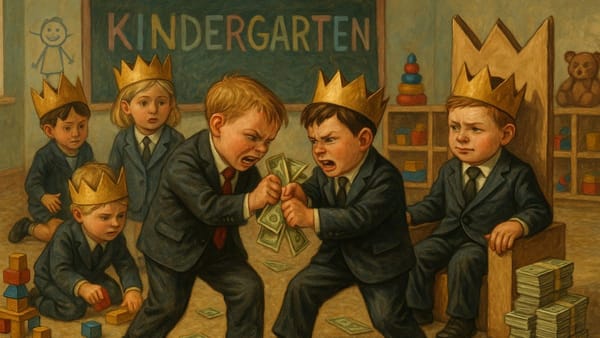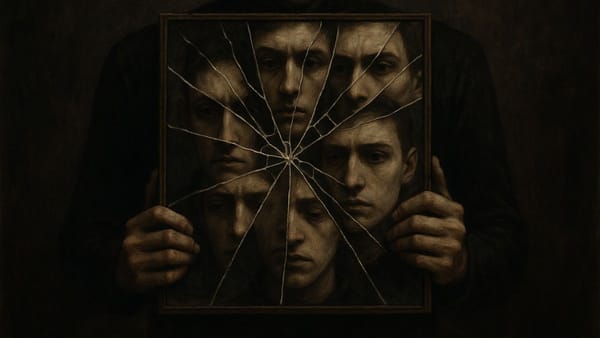Every now and then I take a break from writing and social media to reflect on whether I'm not moving away from the things I want to express through my work - and to get an outside perspective on society or life in general. It's easy to get lost in the pursuit of views or likes and I'm trying to avoid that.
Lately, I've been writing more about spirituality (not religion) or philosophy, and I realized that I was holding myself back for many years not to touch these topics just as if there were something wrong with them - as if I'm breaking some rules.
During all these years I was "secretly" (just not publicly) involved in philosophy and spirituality as my number one interest, but I stuck to writing about all the topics society sees as serious, valuable, or useful. And my interests only served as an innocent background. I realized that I had been holding myself back from questioning life and its seriousness as we know it.
For example, from a deep philosophical or spiritual standpoint, social life is nothing more than a fascinating theatre we play in, like Shakespeare once wonderfully wrote:
All the world’s a stage,
And all the men and women merely players;
They have their exits and their entrances;
And one man in his time plays many parts,
But it's in opposition to everything most cultures teach us - we don't tell people that life is a fascinating play, but present them with a very scary idea of life to get them involved. We condition our children to blindly follow cultural and social keys, and focus on developing their individuality. And then, when they fully deceive themselves as adults they join the society.
In this way, just as in the example of Plato's cave, we can play with the shadows on the wall as much as we want but don't we dare move our heads - not even mention leaving the cave. In other words, we can do whatever we want, no matter how silly, but only within a given system we've been thrown into - society seems to be extremely anxious about whether people would stay if they had a choice.
While it was a historically useful method to glue people together and achieve common survival, we have reached the point where we should let go of the anxiety and become more open to new possibilities of life.
Although it's difficult on many layers.
Not Following Your Culture Is Almost a Betrayal
The first layer is made of human compulsion - the millions of years of evolutionary memory we have in our bodies and the culture that conditions our behavior.
We are essentially social animals that have struggled for a long time to survive and meet their basic needs. But we managed to organize ourselves into larger groups and later create societies united by culture, which allowed us to achieve common goals. But it also conditioned us not to go against our culture or even question it.
It was always better to just accept and follow a certain idea of reality that culture presented to us - it was the better decision to survive, no matter the culture. And despite now we can finally openly question our culture and explore different ones without being punished and even leaving home, most people still have old compulsions to just be quiet and follow their cultural key.
Moreover, once people form their views about the world - most likely based on the culture they've been thrown into, they rarely change anything. People stick to what's familiar and either ignore or even attack what's not - people who don't fit into or even go beyond their culture have always had a hard time, as Plato wrote:
“Those who are able to see beyond the shadows and lies of their culture will never be understood, let alone believed, by the masses.”
In this way, for a Pole like me, coming from the center of Europe, it's almost a betrayal not to follow and promote our conservative Christian way of living, and instead promote various Western cultures, like Buddhism, Yoga, Zen, or Taoism and their practices. Many people find this offensive. It's like saying, "We were wrong, they're right and they have better tools" in a non-verbal way.
Sit and Compare the Shadows on the Wall
The second layer is society and its systems, which are essentially a very creative playground for people to play their roles and engage in existence. It could be, and sometimes still is, an extremely fun thing to do, but also a source of nonsense and suffering caused mainly by human greed.
We created a really fascinating playground with a bunch of complex rules, systems, values, and a whole system of symbols representing them. This is a fantastic thing to do after we have met our basic needs. Unfortunately, we complicated it all to the degree that we seem not to remember that it's just a playground.
We're so obsessed with the symbols and roles that we confuse them with reality - abstractions like money, fame, or status become more important for many people than life itself. And people are so absorbed in all the nonsense that almost no one questions anything - they just sit and stare at the shadows, as Plato wrote.
And it's even not the fault of so-called ordinary people as they are just objects to the systems and groups of interest who benefit from it. There are even modern terms like the economy of attention - yes, there are people specialized to make other people focus and consume certain content, feel in a certain way, etc.
In a sense, we have become prisoners of social life, our role, and even worse, our position in society. We have forgotten what this is all about and made everyone involved in the competitive mess - a fascinating playground has become a toxic source of anxiety and suffering. But everyone would like to win, right?
And since everybody is so involved - willingly or not, no wonder deep philosophy or spirituality is ignored or even seen as a threat to the social life and systemic way of living in general. Following Plato's allegory example, philosophy as well as spirituality are ultimately about leaving the cave, which from the systemic perspective, is simply losing a customer or a vote - a threat.
Feed Your Little Monster
The third layer that connects the previous two is our mind, which feeds on our involvement and lives through it.
The mind is a fantastic tool that has allowed us to dominate this planet - we're not the strongest nor the fastest creatures on this planet, but we have a wonderful ability to abstract thinking. This ability allowed us to create and use various tools to survive and then to build the life we know today.
It has been a useful tool, but we have reached a point where survival is easier than ever, we have more than ever, but also we've never been so detached from nature and reality - all we do is consume abstractions.
We devote such an enormous amount of energy to playing with the mind - creating our individuality, building our ego, projecting our persona, or thinking and imagining in general, that we lose the connection with all the other aspects of life. But the mind has a vested interest in keeping us engaged in all of this.
And since very many people devote their whole lives to abstractions they will ignore the possibility they were wrong or they will defend the illusions.
“There’s simply no polite way to tell people they’ve dedicated their lives to an illusion.” ― Daniel Dennett
Until Philosophers Become Kings
It is normal for people to fear the unknown and we can't blame anyone. But also we should protect the possibility of having a different view. There have to be people who write, talk, sing, or whatever about "these weird things" and they should never be silenced or societies will radicalize - there has to be a possibility to "go out of the cave" for people who seek it.
Also, we should understand that people who dig down into deep philosophy or spirituality are not enemies of society, but a great blessing to it. Of course, there are madmen who use the tools as escapism, yet it's another story.
The real ones aren't like average influencers full of greed with great egos, but they are people with great humility and kindness who live in the present and don't care too much about materialism or appearances.
Moreover, liberated people don't have to do or prove anything - they are free of nonsense and can as well live in the forest far from society in great peace. But when they don't leave they don't want to preach to the world or punish people, but bring it back to its senses, reduce anxiety, and improve the wellbeing of fellow beings with outside perspectives on life - they are not a danger to society.
“There will be no end to the troubles of the state or indeed of humanity until philosophers become kings or until those we now call kings really and truly become philosophers.” ― Plato
Thanks for reading. If you enjoy my work and want more like this, consider supporting it. This space exists thanks to readers — essays and research take time. You can subscribe, contribute, or explore reading lists I curate. Every bit of support helps.







